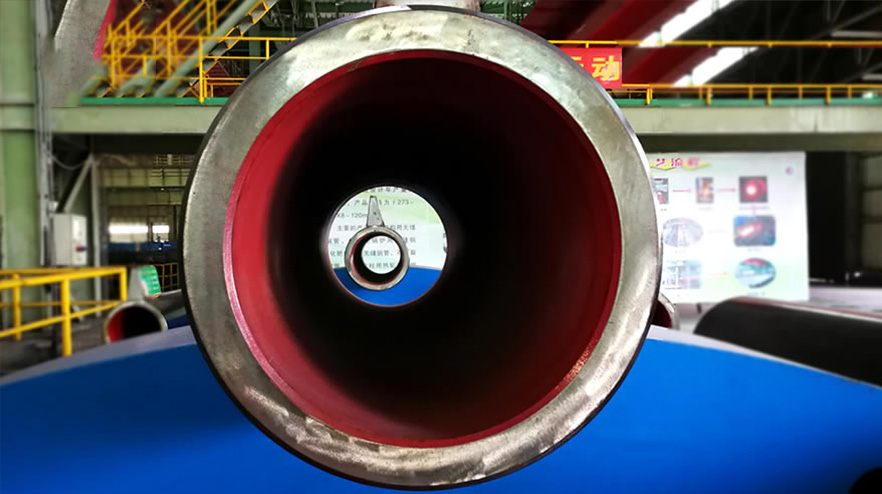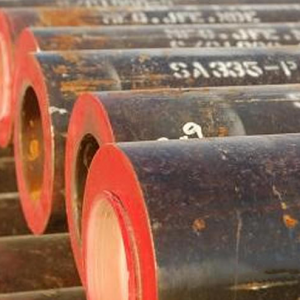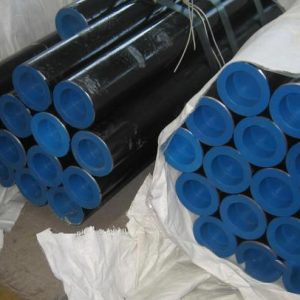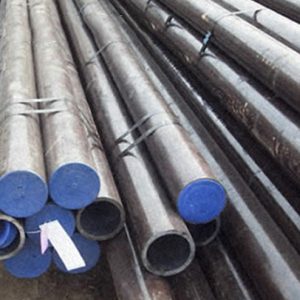ASTM A333 Gr.8 Ultra-Low Temperature Steel Pipe is applicated for Ultra-low temperature service.
As the results of the experimental data, our factory successfully completed the grade of steel for Gr8 specifications for cryogenic Φ 355.6 x 50.8 mm pipe heat treatment.
The Gr8(commonly known as 9%Ni) steel pipe is mainly used for the storage and transportation of liquefied natural gas, and is one of the most technologically advanced, difficult and value-added products in civil steel products.Because of its flammability and ultra-low temperature, the ultra-low temperature steel used for storage and transportation of liquefied natural gas must have the comprehensive characteristics of strength, thermal stress and strain, welding performance and corrosion resistance.Therefore, whether such products can be produced is an important symbol representing the overall technical level of a steel enterprise.The successful production of Gr8 cryogenic tube effectively expands the variety range of 720 units and lays a foundation for further development of the market.
A333 Gr8 Cryogenic Pipe is a brand in American ASTM standard, which is mainly used for storage and transportation of liquefied natural gas. It is one of the products with the highest technical level, difficulty and added value in civil steel products.Whether this kind of products can be produced successfully represents the overall technical level of an enterprise.In order to ensure this kind of steel pipe material requirement, valingheng steel has designed the steelmaking and smelting process in its own innovation.The test results of the steel pipe developed and produced show that the performance data of the steel pipe obtained by the heat treatment process are up to standard.
The Grade 8 steel involved is similar to AISI 4032 Low Alloy Steel. ASTM A333 Grade 8 Pipe shall be made by the seamless or welding process with the addition of no filler metal in the welding operation.
Packing:
Bare packing/bundle packing/crate packing/wooden protection at the both sides of tubes and suitably protected for sea-worthily delivery or as requested.
Inspection and Test: Chemical Composition Inspection, Mechanical Properties Test(Tensile Strength,Yield Strength, Elongation, Flaring, Flattening, Bending, Hardness, Impact Test), Surface and Dimension Test,No-destructive Test, Hydrostatic Test.
Surface Treatment: Oil-dip, Varnish, Passivation, Phosphating, Shot Blasting.
Both ends of each crate will indicate the order no., heat no., dimensions, weight and bundles or as requested.
Chemical Compositions(%)
Compositions Data
Carbon(max.) 0.13
Manganese 0.90 max
Phosphorus(max.) 0.025
Sulfur(max.) 0.025
Silicon 0.13-0.32
Nickel 8.40-9.60
Chromium …
Other Elements …
Mechanical Properties
Properties PSI (Longitudinal) MPa(Transverse)
Tensile strength, min, (MPa) 100 000 690
Yield strength, min, (MPa) 75 000 515
Basic minimum elongation for walls 5/16 in. [8mm] and over in thickness, strip tests, and for all small sizes tested in full section. 22 —
When standard round 2-in, or 50-mm gage length or proportionally smaller size test specimen with the gage length equal to 4D (4 times the diameter) is used 16 —
For strip tests, a deduction for each 1/32 in [0.8 mm] decrease in wall thickness below 5/16 in [8 mm] from the basic minimum elongation of the following percentage 1.25 —
Elongation in 2 in or 50 mm, min, %:
Wall Thickness
Grade 8
in
mm
Longitudinal
Transverse
5/16 (0.312) 8 22 —
9/32 (0.281) 7.2 21 —
1/4 (0.250) 6.4 20 —
7/32 (0.219) 5.6 18 —
3/16 (0.188) 4.8 17 —
5/32 (0.156) 4 16 —
1/8 (0.125) 3.2 15 —
3/32 (0.094) 2.4 13 —
1/16 (0.062) 1.6 12 —
MECHANICAL TESTING
Transverse or Longitudinal Tension Test and Flattening Test, Hardness Test, or Bend Test For material heat treated in a batch-type furnace, tests shall be made on 5% of the pipe from each treated lot. For small lots, at least one pipe shall be tested. For material heat treated by the continuous process, tests shall be made on a sufficient number of pipe to constitute 5% of the lot, but in no case less than 2 pipe. Hydrostatic Test Impact Test One notched bar impact test, consisting of breaking three specimens shall be made from each heat represtented in a heat-treatment load on specimens taken from the finished pipe.




